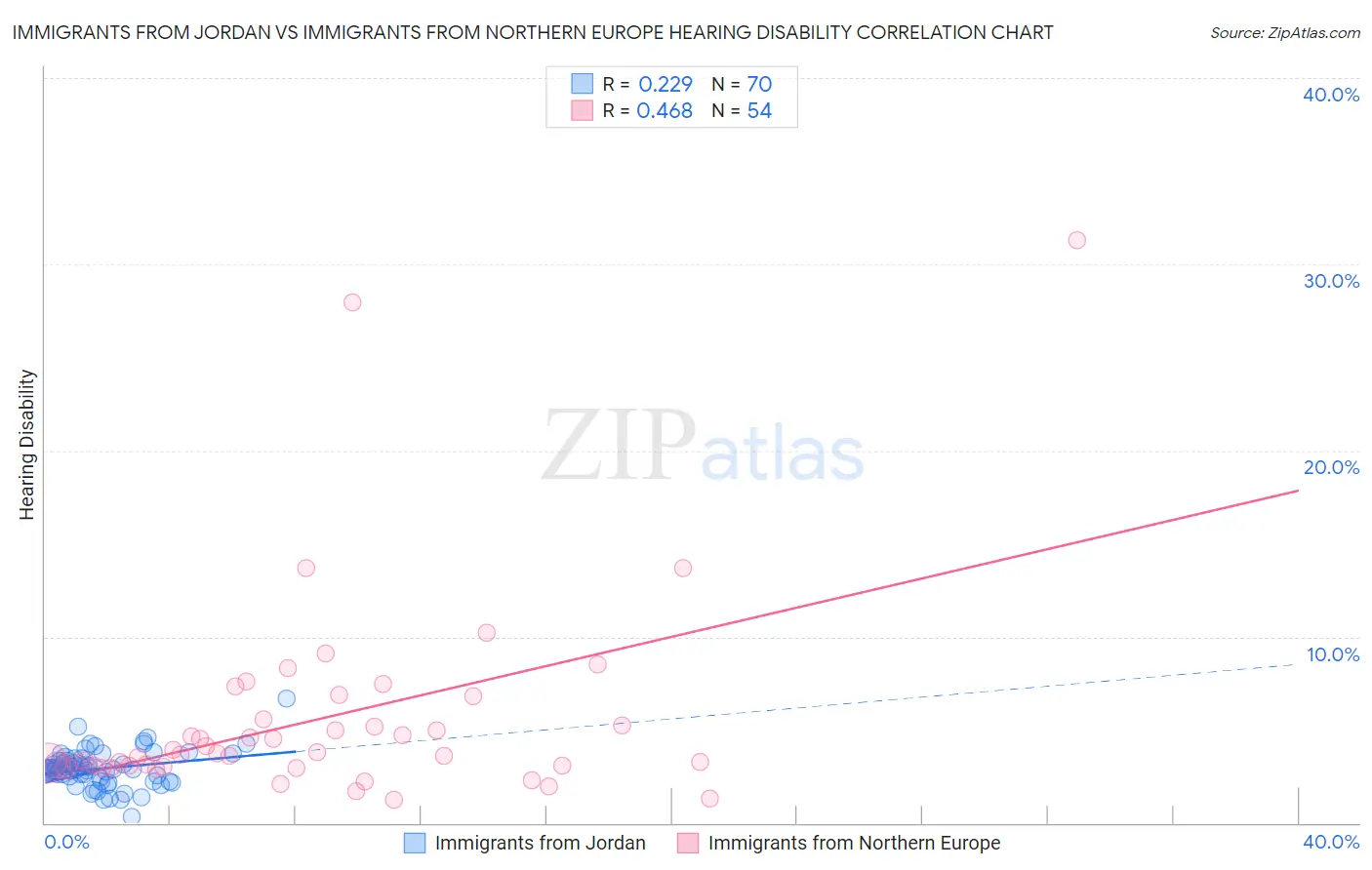Immigrants from Jordan vs Immigrants from Northern Europe Hearing Disability
COMPARE
Immigrants from Jordan
Immigrants from Northern Europe
Hearing Disability
Hearing Disability Comparison
Immigrants from Jordan
Immigrants from Northern Europe
2.9%
HEARING DISABILITY
83.7/ 100
METRIC RATING
140th/ 347
METRIC RANK
3.2%
HEARING DISABILITY
7.0/ 100
METRIC RATING
218th/ 347
METRIC RANK
Immigrants from Jordan vs Immigrants from Northern Europe Hearing Disability Correlation Chart
The statistical analysis conducted on geographies consisting of 181,270,296 people shows a weak positive correlation between the proportion of Immigrants from Jordan and percentage of population with hearing disability in the United States with a correlation coefficient (R) of 0.229 and weighted average of 2.9%. Similarly, the statistical analysis conducted on geographies consisting of 477,037,225 people shows a moderate positive correlation between the proportion of Immigrants from Northern Europe and percentage of population with hearing disability in the United States with a correlation coefficient (R) of 0.468 and weighted average of 3.2%, a difference of 10.3%.

Hearing Disability Correlation Summary
| Measurement | Immigrants from Jordan | Immigrants from Northern Europe |
| Minimum | 0.34% | 1.2% |
| Maximum | 6.7% | 31.3% |
| Range | 6.3% | 30.1% |
| Mean | 2.9% | 5.6% |
| Median | 2.9% | 3.7% |
| Interquartile 25% (IQ1) | 2.4% | 3.1% |
| Interquartile 75% (IQ3) | 3.4% | 5.5% |
| Interquartile Range (IQR) | 0.92% | 2.5% |
| Standard Deviation (Sample) | 0.99% | 5.5% |
| Standard Deviation (Population) | 0.98% | 5.4% |
Similar Demographics by Hearing Disability
Demographics Similar to Immigrants from Jordan by Hearing Disability
In terms of hearing disability, the demographic groups most similar to Immigrants from Jordan are Bermudan (2.9%, a difference of 0.020%), Immigrants from Costa Rica (2.9%, a difference of 0.060%), Sri Lankan (2.9%, a difference of 0.070%), Subsaharan African (2.9%, a difference of 0.070%), and Immigrants from Brazil (2.9%, a difference of 0.17%).
| Demographics | Rating | Rank | Hearing Disability |
| Immigrants | Syria | 85.8 /100 | #133 | Excellent 2.9% |
| Ugandans | 85.5 /100 | #134 | Excellent 2.9% |
| Soviet Union | 84.8 /100 | #135 | Excellent 2.9% |
| Immigrants | Brazil | 84.6 /100 | #136 | Excellent 2.9% |
| Sri Lankans | 84.1 /100 | #137 | Excellent 2.9% |
| Immigrants | Costa Rica | 84.0 /100 | #138 | Excellent 2.9% |
| Bermudans | 83.8 /100 | #139 | Excellent 2.9% |
| Immigrants | Jordan | 83.7 /100 | #140 | Excellent 2.9% |
| Sub-Saharan Africans | 83.3 /100 | #141 | Excellent 2.9% |
| Laotians | 81.1 /100 | #142 | Excellent 2.9% |
| Immigrants | Bahamas | 80.9 /100 | #143 | Excellent 2.9% |
| Immigrants | Bulgaria | 79.2 /100 | #144 | Good 2.9% |
| Immigrants | Congo | 78.9 /100 | #145 | Good 2.9% |
| Brazilians | 78.7 /100 | #146 | Good 2.9% |
| Tongans | 78.6 /100 | #147 | Good 2.9% |
Demographics Similar to Immigrants from Northern Europe by Hearing Disability
In terms of hearing disability, the demographic groups most similar to Immigrants from Northern Europe are Russian (3.2%, a difference of 0.040%), New Zealander (3.2%, a difference of 0.060%), Immigrants from Norway (3.2%, a difference of 0.12%), Malaysian (3.2%, a difference of 0.12%), and Immigrants from Laos (3.2%, a difference of 0.12%).
| Demographics | Rating | Rank | Hearing Disability |
| Romanians | 12.1 /100 | #211 | Poor 3.1% |
| Pakistanis | 11.1 /100 | #212 | Poor 3.1% |
| Immigrants | Iraq | 10.5 /100 | #213 | Poor 3.1% |
| Australians | 8.1 /100 | #214 | Tragic 3.2% |
| Bangladeshis | 8.1 /100 | #215 | Tragic 3.2% |
| Immigrants | Norway | 7.3 /100 | #216 | Tragic 3.2% |
| Russians | 7.1 /100 | #217 | Tragic 3.2% |
| Immigrants | Northern Europe | 7.0 /100 | #218 | Tragic 3.2% |
| New Zealanders | 6.8 /100 | #219 | Tragic 3.2% |
| Malaysians | 6.6 /100 | #220 | Tragic 3.2% |
| Immigrants | Laos | 6.6 /100 | #221 | Tragic 3.2% |
| Immigrants | Oceania | 6.5 /100 | #222 | Tragic 3.2% |
| Mexicans | 5.6 /100 | #223 | Tragic 3.2% |
| Icelanders | 5.2 /100 | #224 | Tragic 3.2% |
| Latvians | 5.1 /100 | #225 | Tragic 3.2% |